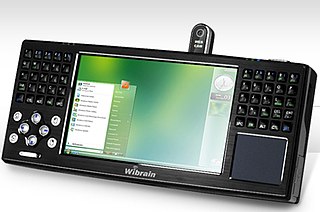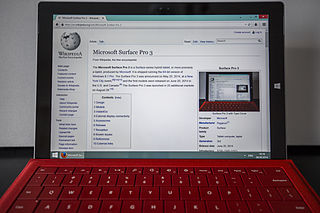
Lenovo Group Limited, trading as Lenovo, is a Chinese multinational technology company specializing in designing, manufacturing, and marketing consumer electronics, personal computers, software, business solutions, and related services. Products manufactured by the company include desktop computers, laptops, tablet computers, smartphones, workstations, servers, supercomputers, data storage devices, IT management software, and smart televisions. Its best-known brands include its ThinkPad business line of laptop computers, the IdeaPad, Yoga, LOQ, and Legion consumer lines of laptop computers, and the IdeaCentre, LOQ, Legion, and ThinkCentre lines of desktop computers. As of 2024, Lenovo is the world's largest personal computer vendor by unit sales.

InFocus Corporation is a privately owned American company based in the state of Oregon. Founded in 1986, the company develops, manufactures, and distributes DLP and LCD projectors and accessories as well as large-format touch displays, software, LED televisions, tablets and smartphones. InFocus also offers video calling services. Formerly a NASDAQ listed public company, InFocus was purchased by Image Holdings Corp., owned by John Hui, in 2009 and is now a wholly owned subsidiary headquartered in Tigard, Oregon.

A tablet computer, commonly shortened to tablet, is a mobile device, typically with a mobile operating system and touchscreen display processing circuitry, and a rechargeable battery in a single, thin and flat package. Tablets, being computers, have similar capabilities, but lack some input/output (I/O) abilities that others have. Modern tablets largely resemble modern smartphones, the only differences being that tablets are relatively larger than smartphones, with screens 7 inches (18 cm) or larger, measured diagonally, and may not support access to a cellular network. Unlike laptops, tablets usually run mobile operating systems, alongside smartphones.

An ultra-mobile PC, or ultra-mobile personal computer (UMPC), is a miniature version of a pen computer, a class of laptop whose specifications were launched by Microsoft and Intel in Spring 2006. Sony had already made a first attempt in this direction in 2004 with its Vaio U series, which was only sold in Asia. UMPCs are generally smaller than subnotebooks, have a TFT display measuring (diagonally) about 12.7 to 17.8 centimetres, are operated like tablet PCs using a touchscreen or a stylus, and can also have a physical keyboard. There is no clear boundary between subnotebooks and ultra-mobile PCs, but UMPCs commonly have major features not found in the common clamshell laptop design, such as small keys on either side of the screen, or a slide-out keyboard.
A mobile operating system is an operating system used for smartphones, tablets, smartwatches, smartglasses, or other non-laptop personal mobile computing devices. While computers such as typical/mobile laptops are "mobile", the operating systems used on them are usually not considered mobile, as they were originally designed for desktop computers that historically did not have or need specific mobile features. This "fine line" distinguishing mobile and other forms has become blurred in recent years, due to the fact that newer devices have become smaller and more mobile, unlike the hardware of the past. Key notabilities blurring this line are the introduction of tablet computers, light laptops, and the hybridization of the two in 2-in-1 PCs.

Samsung Galaxy is a series of computing and Android mobile computing devices that are designed, manufactured and marketed by Samsung Electronics since 29 June 2009. The product line includes the Samsung Galaxy S series of high-end phones, Galaxy Z series of high-end foldables, Galaxy A series, Galaxy F series and Galaxy M series of mid-range phones, the Galaxy Book of laptops, the Samsung Galaxy Tab series, the Samsung Galaxy Watch, the Galaxy Buds series and the Galaxy Fit.
The history of tablet computers and the associated special operating software is an example of pen computing technology, and thus the development of tablets has deep historical roots. The first patent for a system that recognized handwritten characters by analyzing the handwriting motion was granted in 1914. The first publicly demonstrated system using a tablet and handwriting recognition instead of a keyboard for working with a modern digital computer dates to 1956.
Atom is a system on a chip (SoC) platform designed for smartphones and tablet computers, launched by Intel in 2012. It is a continuation of the partnership announced by Intel and Google on September 13, 2011 to provide support for the Android operating system on Intel x86 processors. This range competes with existing SoCs developed for the smartphone and tablet market from companies such as Texas Instruments, Nvidia, Qualcomm and Samsung. Unlike these companies, which use ARM-based CPUs designed from the beginning to consume very low power, Intel has adapted the x86-based Intel Atom line of CPU developed for low power usage in netbooks, to even lower power usage.

Microsoft Lumia is a discontinued line of mobile devices that was originally designed and marketed by Nokia and later by Microsoft Mobile. Introduced in November 2011, the line was the result of a long-term partnership between Nokia and Microsoft—as such, Lumia smartphones run on Microsoft software, the Windows Phone operating system; and later the newer Windows 10 Mobile. The Lumia name is derived from the partitive plural form of the Finnish word lumi, meaning "snow".

The post-PC era was a market trend observed during the late 2000s and early 2010s involving a decline in the sales of personal computers (PCs) in favor of post-PC devices; which include mobile devices such as smartphones and tablet computers as well as other mobile computers such as wearable and ubiquitous ones. These devices emphasize portability and connectivity, including the use of cloud-based services, more focused "apps" to perform tasks, and the ability to synchronize information between multiple devices seamlessly.

Microsoft Surface is a series of touchscreen-based personal computers, tablets, and interactive whiteboards designed and developed by Microsoft, most of them running the Windows operating system. They are designed to be premium devices that set examples for manufacturers of other Windows-compatible products. It comprises several generations of hybrid tablets, 2-in-1 detachable notebooks, a convertible desktop all-in-one, an interactive whiteboard, and various accessories, many with unique form factors. The majority of devices in the Surface lineup are based on Intel processors and compatible with Windows 10 or Windows 11.

Honor Device Co., Ltd., commonly known as HONOR, is a Chinese consumer electronics company majority-owned by Shenzhen Zhixin New Information Technology Co. Ltd. It was formerly a subsidiary of Huawei, who sold the brand in November 2020. Honor develops smartphones, tablet computers, wearables and mobile device softwares.

Xolo, stylised as XOLO, is an Indian mobile handset brand by Lava International. It manufactures personal electronics devices such as smartphones, tablets and laptops, and accessories such as powerbanks.

Tango was an augmented reality computing platform, developed and authored by the Advanced Technology and Projects (ATAP), a skunkworks division of Google. It used computer vision to enable mobile devices, such as smartphones and tablets, to detect their position relative to the world around them without using GPS or other external signals. This allowed application developers to create user experiences that include indoor navigation, 3D mapping, physical space measurement, environmental recognition, augmented reality, and windows into a virtual world.

Lava International Ltd. is an Indian multinational technology company that manufactures smartphones, laptops, computer hardware, and other consumer electronics. It was founded in 2009 by Hari Om Rai, Shailendra Nath Rai, Sunil Raina, Sanjeev Agarwal, Sunil Bhalla and Vishal Sehgal. It is headquartered in Noida, India and operates in other countries in South Asia, Middle East and Africa under the Lava brand name.

Microsoft Mobile Oy was a Finland subsidiary of Microsoft Devices involved in the development and manufacturing of mobile phones. Based in Keilaniemi, Espoo, it was established in 2014 following the acquisition of Nokia's Devices and Services division by Microsoft in a deal valued at €5.4 billion, which was completed in April 2014. Nokia's then-CEO, Stephen Elop, joined Microsoft as president of its Devices division following the acquisition, and the acquisition was part of Steve Ballmer's strategy to turn Microsoft into a "devices and services" company. Under a 10-year licensing agreement, Microsoft Mobile held rights to sell feature phones running the S30/S30+ platform under the Nokia brand.

The Surface Pro 3 is the third-generation Surface-series 2-in-1 detachable, designed, developed, marketed, and produced by Microsoft. It originally ran the Windows 8.1 Pro operating system (OS), but the optional upgrade to Windows 10 Pro (OS) operating system was later added.

ASUSTeK Computer Inc. is a Taiwanese multinational computer, phone hardware and electronics manufacturer headquartered in Beitou District, Taipei, Taiwan. Its products include desktop computers, laptops, netbooks, mobile phones, networking equipment, monitors, Wi-Fi routers, projectors, motherboards, graphics cards, optical storage, multimedia products, peripherals, wearables, servers, workstations and tablet PCs. The company is also an original equipment manufacturer (OEM).

Human Mobile Devices (HMD), formally HMD Global, is a Finnish mobile phone manufacturer. The company is made up of the mobile phone business that the Nokia Corporation sold to Microsoft in 2014, then bought back in 2016. HMD began marketing Nokia-branded smartphones and feature phones on 1 December 2016. The company has exclusive rights to the Nokia brand for mobile phones through a licensing agreement. The HMD brand was initially only used for corporate purposes and does not appear in advertising, whereas the name "Nokia Mobile" is used on social media. As it was launched, the abbreviation HMD stood for Hon Hai Mobile Devices. This was in reference to the main shareholder at the time of its creation: the Taiwanese group Foxconn. In January 2024, HMD rebranded to 'Human Mobile Devices', and will use their own branding on future devices alongside that of Nokia.
















